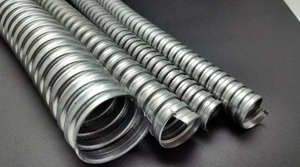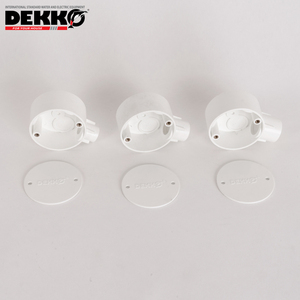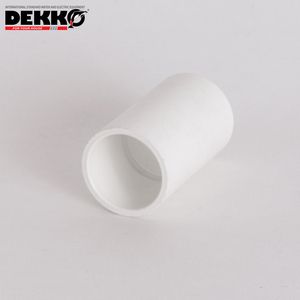(3371 products available)




























































































































































































































A round PVC conduit is a tube made of polyvinyl chloride (PVC) used to protect and route electrical wiring. It comes in different sizes and can be either non-metallic or flexible. The following are the key types of round PVC conduits:
Rigid Non-Metallic Round PVC Conduit
This electrical conduit is manufactured using the extrusion process. It involves the use of molds to produce tubes of different diameters and lengths. It is suitable for enclosing conductors in power distribution wiring for various electrical equipment. The non-metallic is available in different diameters and lengths. It is lightweight and easy to install. It is resistant to moisture, chemicals, and UV rays.
Applications:
Electrical installations in residential, commercial, and industrial buildings. It protects wiring in areas with high moisture, chemicals, or UV exposure. It is ideal for outdoor electrical installations and exposed wiring.
Flexible Non-Metallic Round PVC Conduit
This conduit type is made using a different method called calendaring, which produces flexible, ridged, non-metallic tubes. It is suitable for applications where bending and flexibility are required. The flexible conduit is available in different diameters, from 0.5 inches to 2 inches. It is lightweight, highly flexible, and easy to install. It is resistant to moisture, chemicals, and UV rays.
Applications:
To protect and route wiring for appliances, tools, and machines. It is ideal for areas with frequent movement or flexible connections, such as in HVAC systems and power cords. It is used in automotive, marine, and aviation applications for wiring protection in tight spaces and dynamic environments.
Heavy-Duty Round PVC Conduit
Heavy-duty round PVC is a non-metallic, rigid conduit. It is thicker than the standard round PVC conduit. It is made from a stronger polymer blend, providing improved impact resistance and durability. This conduit protects electrical wiring in high-stress or hazardous environments. It offers superior protection against mechanical damage, moisture, and UV radiation. The HDPE conduit is available in various sizes, typically ranging from 2 inches to 6 inches in diameter and larger for specific applications. It is more robust and durable while still being relatively lightweight.
Applications:
It is usually buried underground to protect electrical wiring from moisture, soil pressure, and other environmental hazards. It is used in industrial settings to protect wiring from chemicals, heat, and mechanical stress. It is employed in traffic signals, street lighting, and other outdoor electrical installations.
Round PVC conduits are used in electrical wiring to protect and support wires. Here are some features and functions of round PVC conduits:
Protection
Conduits are cables or electrical wires for support and protection. The electrical wires are safeguarded from environmental damage, impacts, and abrasions. These conduits shield wires from thermal heat, sharp objects, falling debris, and animal bites. They also prevent the cables from getting tangled or twisted, which can cause damage or reduce efficiency. Additionally, conduits minimize the risk of cuts or scrapes from exposed wires.
Round Shape
The round shape of these conduits helps them distribute stress evenly. This is especially important in applications where there is movement or vibration. The round shape also helps to reduce air resistance when pulling wires through the conduit. Additionally, the round shape allows for easy coupling and fitting of conduits.
Material
PVC is a widely-used material in conduit manufacturing. It is durable and lightweight and comes at a lower price compared to other materials. PVC is corrosion-resistant and can be produced in different sizes and thicknesses. Other materials used in conduits are steel and rigid aluminum. They offer improved mechanical protection and are more suitable for high-temperature applications.
Sizes
Round PVC conduits are available in different sizes. This makes them versatile for various applications. They are classified into nominal bore sizes and outside diameters. The nominal bore size indicates the internal diameter of the pipe. Common sizes include 20mm, 25mm, 32mm, 40mm, 50mm, and 63mm. External diameter sizes include 25mm, 32mm, 40mm, 50mm, 63mm, and 75mm.
Joinery Methods
There are several methods of joining round PVC conduit, including solvent cementing, threading, and welding. Solvent cementing involves applying a solvent to soften the pipe edges and then adding a cement solution to create a firm bond. It is commonly used in non-conductive and low-pressure applications. Threading involves cutting matching threads on the conduit ends and screwing them together using a metal fitting. It allows for easy disassembly and is used with steel or aluminum conduits. Welding joins conduits using heat or electric current to form a solid bond. It produces a strong joint but requires skilled personnel to execute it.
Residential Wiring:
Round PVC conduits are frequently used in home construction projects. They safeguard and route electrical cables across locations such as gardens, garages, and outdoor lighting fixtures. Their corrosion resistance makes them appropriate for outside and humid conditions.
Commercial Buildings:
In business settings, round PVC pipes for electrical wiring ensure the efficient and safe transport of electricity to lighting, strength retailers, and device. Their durability and ease of set up make them perfect for places of work, retail spaces, and industrial centers.
Industrial Applications:
Industries use round PVC conduits to shield electric cables in manufacturing unit configurations, machinery areas, and industrial web sites. They guard cables from mechanical damage, moisture, and chemical substances, ensuring dependable operations.
Underground Wiring:
Conduits can be laid underground to transport and defend cables from the street to buildings, utilities, and different locations. They shield cables from impacts, moisture, and whilst being buried, making them appropriate for underground installations.
Exposed Applications:
Round PVC conduits can be used for cable management in walls, ceilings, and floors in situations where cables want to be extensively included or routed uncovered. This includes business garages, warehouses, and business kitchens. They provide a neat and prepared solution for electric installations.
Moisture-Prone Areas:
Conduits protect and direct electric cables in places susceptible to moisture or humidity, which incorporates toilets, kitchens, and outdoor spaces. Their waterproof nature makes them appropriate for these environments.
Low-Voltage Wiring:
They are used to guard and route low-voltage cables, including statistics lines, telephone wires, and coaxial cables, in residential and industrial settings. Their ease of setup and protection makes them best for low-voltage applications.
Emergency and Exit Lighting:
Round PVC conduits ensure the powerful set-up and protection of emergency lighting, exit symptoms and symptoms, and safety digicam cables in constructing emergency situations. Their sturdiness ensures these crucial structures remain useful.
Solar Power Systems:
Conduits shield and course cables from photovoltaic panels, inverters, and battery packs in sun energy installations. They shield cables from UV radiation, weather factors, and mechanical damage, ensuring the efficient operation of renewable electricity systems.
There are several factors to consider when purchasing round pvc conduit to ensure the right product is selected for a specific application. Here are some of them:
Conduit Size
The size of the conduit is an important factor to consider. Conduits come in different sizes. It is important to choose a size that is suitable for the electrical wiring to be installed. A larger conduit will be able to accommodate more wires and cables, while a smaller conduit is more suitable for tight spaces.
Conduit Type
There are two types of conduits: rigid and flexible. Rigid conduit is used for straight runs, while a flexible conduit is used for bends and corners. Choosing the right type of conduit for the application is important.
Conduit Thickness
The thickness of the conduit is also an important consideration. A thicker conduit wall will provide more protection for the wires and cables. However, a thicker wall also means less space inside the conduit for the wires.
Conduit Length
The length of the conduit should be sufficient to cover the distance between the source of power and the area where the wiring is to be installed. It is also important to consider the number of bends and corners when calculating the length of the conduit.
Conduit Color
The color of the conduit is not just for aesthetics. Some colors are used to identify the type of wire or cable inside the conduit. For example, black is used for electrical power, while white is for lighting circuits.
Conduit Accessories
Several accessories are needed when installing a conduit, such as junction boxes, bends, sockets, and plugs. It is important to consider these accessories when purchasing a conduit to ensure they are readily available.
Quality and Standards
It is important to choose a conduit that meets the necessary industry standards. This ensures that the conduit is of good quality and will last for a long time. It is also important to read reviews from other customers to get an idea of the quality of the conduit.
Conduit Brand
The brand of the conduit is also something to consider. There are many brands in the market, and it can be hard to know which one to choose. It is important to choose a reputable brand that produces high-quality products.
Q: What are the sizes of round PVC conduits?
A: The sizes of conduits vary depending on the manufacturer. Generally, they range from 20mm to 50mm. The 20mm size is commonly used for wiring installations in homes, while the 25mm size is used for electrical wiring in commercial buildings. The 32mm size is used for larger cables, and the 40mm size is used for outdoor applications. The 50mm size is ideal for very large cable runs.
Q: Are round PVC conduits reliable?
A: Yes, they are reliable. Round PVC conduits are long-lasting and provide excellent cable protection. They are resistant to UV light, chemicals, and moisture. These conduits are also impact and crush-resistant. They are used in different applications, including underground and outdoor installations.
Q: What are the types of conduits?
A: There are five main types of conduits. These include PVC, EMT, flexible, IMC, and RMC conduits. PVC conduits are popular because they are light and resist corrosion. EMT conduits are made of steel or aluminum and are used for internal wiring. Flexible conduits are used in applications where cables need to bend and move easily. IMC and RMC conduits are made of steel and used in heavy-duty applications.
Q: What are the disadvantages of PVC conduits?
A: Even though round PVC conduits have many advantages, they also have some disadvantages. For example, they cannot be used for bending around corners and curves. Also, they cannot be used for heat and water transfer. Additionally, PVC conduits are prone to expansion and contraction due to changes in temperature. This can cause damage to the cables inside.
The web search volume for the keyword "round pvc conduit" shows a steady average monthly web search volume of 10, with no significant changes over the past year or three months. The 12-month data reflects a pattern of alternating months with zero web searches and months with ten web searches.
Analyzing the trend in detail, "round pvc conduit" experiences fluctuations that appear to follow a seasonal pattern. The months with zero web searches (December, January, July, and October) suggest a possible seasonal dip, where demand for this electrical supply might wane. Conversely, the months with ten web searches (February, March, April, May, August, September, and November) indicate periods of consistent interest or need.
This pattern of web search volume trends could be influenced by various factors such as construction cycles, which often ramp up in the spring and fall, aligning with the peaks in web search volume. Additionally, the drop in web searches during colder months could be related to a slowdown in construction activities, which typically occur during winter. However, without further context or data on the construction industry's seasonal trends, these fluctuations in web search volume for "round pvc conduit" remain an interesting observation in the electrical equipment and supplies category.